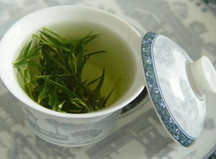 Chinese tea is a beverage made from the leaves of tea plants (Camellia sinensis) and boiled water. Tea leaves are processed using traditional Chinese methods. Chinese tea is drunk throughout the day, including during meals, as a substitute for plain water, for health, or for simple pleasure. The Chinese have enjoyed tea for millennia and the history of tea in China is long and complex.
Chinese tea is a beverage made from the leaves of tea plants (Camellia sinensis) and boiled water. Tea leaves are processed using traditional Chinese methods. Chinese tea is drunk throughout the day, including during meals, as a substitute for plain water, for health, or for simple pleasure. The Chinese have enjoyed tea for millennia and the history of tea in China is long and complex.History about Chinese Tea
According to legend, tea was first discovered by the Chinese emperor and herbalist, whose name was Shennong in 2737 BCE. It is said that the emperor liked his drinking water boiled before he drank it so it would be clean, so that is what his servants did. One day, on a trip to a distant region, he and his army stopped to rest. A servant began boiling water for him to drink, and a dead leaf from the wild tea bush fell into the water. It turned a brownish color, but it was unnoticed and presented to the emperor anyway. The emperor drank it and found it very refreshing, and cha (tea) came into being.
During the Tang Dynasty, a Japanese monk brought tea seeds from Zhejiang Province to Japan. Later in the Southern Song Dynasty, Zen masters brought tea procedures and wares from China to Japan, promoting the initiation of the Japanese tea ceremony. In the Song Dynasty, Arabic merchants exported tea from Quanzhou, Fujian Province. In the Ming Dynasty, tea was sold to Southeast Asian and South African countries. In 1610 it went to Europe via Macau in a Dutch merchant ship. Thus it became an international drink.
Dragon Well Tea
One of the most famous tea in China is "Dragon Well Tea", produced in the mountains area where mild climate and plentiful rainfall are plentiful all the year. Nowadays, with the increase in production, Dragon Well tea is divided into many species, just like Xihu, Longjing, Qiantang Longjing and Yuezhou Longjing, etc. Leaves of Dragon Well Tea are a treasure if you picked earlier. In fact, Dragon Well Tea could be picked in different periods of time. Best time to pick them up is before Qing Ming Festival. Selection process of this tea is very difficult and strict. Different levels tea has different methods to bake then producing different tastes when appreciating them.
Tea ceremony is also a traditional performance in China. During you visit to China, never miss the chance to taste of Chinese tea and appreciate the excellent Tea ceremony.
